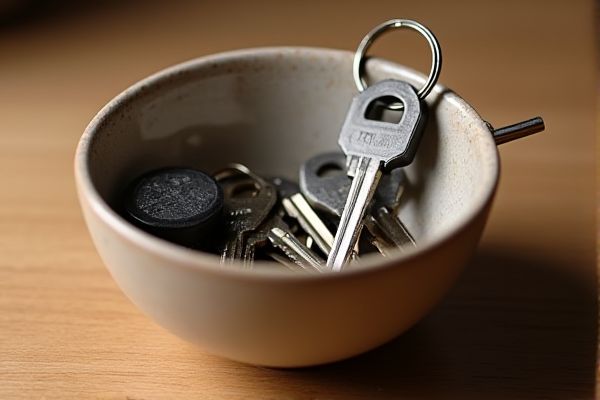
A key organizer keeps your keys neatly arranged in a compact, foldable design that prevents jingling and damage, while a key bowl offers a simple, accessible place to drop keys without organizing them. Discover which option suits your lifestyle best by reading the rest of the article.
Table of Comparison
| Feature | Key Organizer | Key Bowl |
|---|---|---|
| Design | Compact, slim, folds keys neatly | Open, bowl-shaped, holds keys loosely |
| Portability | Highly portable, fits in pockets | Stationary, kept on tables or counters |
| Capacity | Holds 5-10 keys securely | Holds unlimited number of keys |
| Organization | Keys arranged and easy to identify | Keys piled with no specific order |
| Use Case | Ideal for everyday carry and travel | Best for home/office key storage |
| Material | Typically metal or durable plastic | Various materials: ceramic, wood, metal |
| Security | Keys less likely to scratch or fall out | Keys can fall out or get misplaced easily |
| Price Range | $15 to $50 | $10 to $30 |
Key Organizer vs Key Bowl: An Overview
Key organizers and key bowls both serve as practical solutions for managing everyday keys, but their design and functionality differ significantly. A key organizer typically consolidates multiple keys into a sleek, compact device shaped like a wallet, reducing bulk and preventing key jangling, while a key bowl offers an open, decorative space to drop keys upon entering a home, enhancing convenience and accessibility. Choosing between a key organizer and a key bowl depends on lifestyle needs, with organizers favored for portability and bowls preferred for stationary placement.
Design and Aesthetics Comparison
The key organizer features a sleek, compact design with a minimalist aesthetic that conceals keys within a slim, metal or plastic frame, enhancing portability and reducing clutter. In contrast, the key bowl offers an open, often decorative design that showcases keys and small items in a visually appealing way, complementing home decor with materials like ceramic, wood, or glass. While the key organizer emphasizes functionality and discreetness, the key bowl focuses on aesthetic appeal and ease of access.
Functionality and Accessibility
Key organizers offer compact, structured storage by stacking keys in a swivel mechanism, reducing bulk and preventing jingling, while key bowls provide an open, easily accessible spot for placing multiple keys without organization. The organized design of key organizers enhances portability and quick key selection but may require manual adjustment for each key, whereas key bowls allow instant drop-and-pick use but lack security and order. Choosing between the two depends on whether users prioritize streamlined portability and protection or easy, visible accessibility within a fixed location.
Space-Saving Solutions
Key organizers provide a compact and structured way to store multiple keys in a slim, foldable case, significantly reducing pocket bulk and clutter. Key bowls serve as a dedicated drop zone for everyday keys, utilizing vertical space effectively without requiring wall mounting, ideal for entryways or desks. Both options enhance space efficiency by streamlining key storage and minimizing surface clutter in small living areas.
Security and Safety Features
Key organizers offer enhanced security with features like locking mechanisms and slim designs that minimize accidental key drops, ensuring your keys stay firmly in place. Key bowls provide easy access but lack secure containment, increasing the risk of lost or misplaced keys in busy environments. Choosing a key organizer enhances your safety by preventing keys from falling or getting lost, protecting your personal information and property access.
Material and Durability Differences
Key organizers typically feature high-grade aluminum or stainless steel, providing superior durability and resistance to corrosion compared to key bowls, which are often made from ceramic, glass, or plastic. The robust construction of key organizers protects keys from scratches and bending, while key bowls emphasize aesthetic appeal and may chip or break under impact. Material density and structural design of organizers ensure longer lifespan and enhanced protection for everyday carry keys relative to the more fragile key bowls.
Portability and Everyday Use
Key organizers offer compact, portable solutions designed for everyday carry, minimizing bulk and preventing key jingle and scratches. In contrast, key bowls serve as stationary storage, ideal for home or office use to keep keys easily accessible but lack portability. For on-the-go convenience, key organizers outperform key bowls by securely holding keys in a streamlined, pocket-friendly design.
Maintenance and Cleaning Tips
Key organizers typically require minimal maintenance, involving occasional wiping with a damp cloth to remove dirt and prevent rust on metal components. Key bowls demand more frequent cleaning, especially if placed near entryways where dust, debris, and moisture accumulate, and can be cleaned easily with soap and water or disinfectant wipes. Regular inspection of both helps ensure longevity and keeps keys organized and hygienic.
Price Point and Value
Key organizers generally offer higher value at a moderate price point due to their compact design and ability to reduce pocket bulk by neatly stacking keys. Key bowls, on the other hand, are often more affordable but lack portability, making them ideal for home use rather than on-the-go convenience. Your choice depends on whether you prioritize cost savings or everyday functional efficiency.
Choosing the Best Option for Your Lifestyle
Key organizers provide compact, secure storage with easy access, ideal for active lifestyles needing organized keys without bulk. Key bowls offer a simple, convenient spot for daily key drop-off, perfect for home settings where quick access is essential. Your choice depends on whether you prioritize portability and protection or ease of use and home organization.
 homyna.com
homyna.com